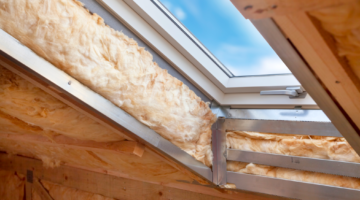
Many landlords out there don’t really care about the property they are renting, as long as they get their rent money, but there are several reasons why you should take a look at some energy saving options:
- Regulations coming in to force in 2016 mean that all rental properties must have an efficiency rating of E or more.
- A more efficient home is more likely to attract tenants – the EPC rating has to be shown to the prospective tenants, so a better rating is going to make for a more efficient home.
- A more efficient home is going to make for happier tenants who will be more able to pay their rent. If they have to spend a fortune on heating – they might not have enough to pay you!
What measures work well for landlords?
Firstly it makes sense to take advantage of free insulation schemes. Free loft and cavity wall insulation is available to most properties in the UK, so get this installed to help improve the rating of the property and keep your tenants warm.

Obviously some measures don’t make sense for the average landlord. If the customer could pay for the improvements as they save however, it might make sense for both the landlord and the tenant. That is where Green Deal finance comes in.
Green Deal for Landlords?
The Green Deal is available to Landlords, and means that in many cases you can get something like a new boiler, wall insulation or renewable technologies installed with little up-front cost, and let the tenant pay for the measures through their electricity bill.
Obviously this won’t suit everyone, but long term tenants may see this as an attractive option to improve the property without having to be out of pocket.
Grants for Landlords?
You may have heard that there is funding available for solid wall insulation. The GDHIF scheme will allow older solid wall properties to receive a grant of thousands of pounds towards the cost of the works, and you could go down the Green Deal route for the rest of the cost.
Why should you bother? Although the cost is high, there are plenty of benefits. External wall insulation will help prevent damp issues, keep the property far warmer, and really improve the rentability and indeed saleability of the property. It is a big improvement and although you could be looking at several thousand pounds after the grant is taken into account, the end result is a much more desirable property.
Solar for rentals?
It might not seem an obvious choice, but there is no reason why you and your tenant cannot benefit from a solar pv system. There are a few ways you can get solar for your rental property and not end up out of pocket:
- Get a free solar company to install the panels. You will need a nicely positioned roof, but there are still companies out there installing free solar panels. It means that you will not be able to get the feed in tariff payments, but it works out completely free for you, and it will make the home more valuable and attractive as any tenants will have much lower energy bills.
- You can install the panels privately and ensure that the feed in tariff comes to you rather than the tenant. This way you are unlikely to recover the full cost of the install, but it will offset it significantly, and you can probably get a higher rent as a result, due to the bills being so much lower.
- Get the tenant to pay for the panels through the Green Deal. You could entice them by offering to pay them the feed in tariff, or lower their rent and claiming the tariff yourself.
Ask the experts
Every property is going to be different, so it is worth getting some advice to see what will suit you and your tenants. Our assessors will be able to talk you through the relative savings and benefits of each measure, so give us a call!
Think we missed something? Do you have a different opinion?
Comment below to get your voice heard…












Do you know if regulations apply to commercial properties? I heard that with the EPC changes coming through in a couple of years time, it will require us to raise the level to a certain minimum standard – do you know for definite whether this has actually gone through and when can we actually expect this?
Hi Raj,
There are plans to make this happen, but nothing is definite when you are talking about a couple of years time and changing governments etc. If and when it does happen however, the targets for landlords are going to be fairly low, probably an E rating, which shouldn’t be too tricky to achieve.